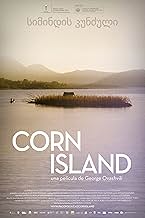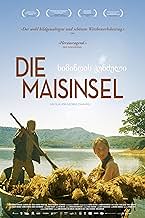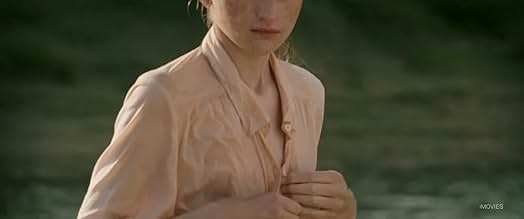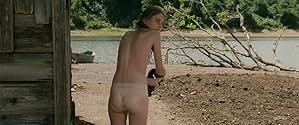Simindis kundzuli
- 2014
- 1h 40min
CALIFICACIÓN DE IMDb
7.4/10
4.8 k
TU CALIFICACIÓN
Agrega una trama en tu idiomaThe river creates and the river destroys in an eternal cycle that even man can't escape.The river creates and the river destroys in an eternal cycle that even man can't escape.The river creates and the river destroys in an eternal cycle that even man can't escape.
- Dirección
- Guionistas
- Elenco
- Premios
- 23 premios ganados y 12 nominaciones en total
- Dirección
- Guionistas
- Todo el elenco y el equipo
- Producción, taquilla y más en IMDbPro
Opiniones destacadas
George Ovashvili's film was showing on my cable, and I decided to check it out... it's actually a film from a decade ago that made the rounds at every major film festival and ended up with 23 wins and 12 nominations! I must say, it truly deserved every single one of them!
The story, written by Roelof Jan Minneboo, George Ovashvili, and Nugzar Shataidze, transports us to Georgia, where the Inguri River's water level drops annually, revealing islands with fertile river-bottom soil. The locals can temporarily claim these islands for a season to grow crops, so an elderly man in an old wooden boat slowly makes his way to one such island. He measures it, digs the earth, tastes the soil, decides it's suitable, and marks his claim with a piece of cloth on a stick. He leaves and returns repeatedly, bringing supplies, including scrap lumber to build a cabin with a thatched roof, and then planting corn with the help of his teenager granddaughter. Almost no words are spoken, so don't worry if you don't have subtitles (for some reason, I only had German subtitles) - you'll be just fine!
A significant aspect of this film is the profound connection between the man and nature, conveyed through captivating imagery and visuals - a timeless story that seems so primitive... intentionally so, in my opinion.
Another aspect of the film is the island's location: in the middle of the Inguri River, dividing Georgia from Abkhazia. This off-screen conflict brings soldiers from both sides, disturbing the intense bond between nature and the old man and his granddaughter.
The film takes its time with everything, and it follows the nature's pace of the flowing river, growing corn... and it feels great watching things unfolding slowly. Real life feeling! Almost perfect film!
The story, written by Roelof Jan Minneboo, George Ovashvili, and Nugzar Shataidze, transports us to Georgia, where the Inguri River's water level drops annually, revealing islands with fertile river-bottom soil. The locals can temporarily claim these islands for a season to grow crops, so an elderly man in an old wooden boat slowly makes his way to one such island. He measures it, digs the earth, tastes the soil, decides it's suitable, and marks his claim with a piece of cloth on a stick. He leaves and returns repeatedly, bringing supplies, including scrap lumber to build a cabin with a thatched roof, and then planting corn with the help of his teenager granddaughter. Almost no words are spoken, so don't worry if you don't have subtitles (for some reason, I only had German subtitles) - you'll be just fine!
A significant aspect of this film is the profound connection between the man and nature, conveyed through captivating imagery and visuals - a timeless story that seems so primitive... intentionally so, in my opinion.
Another aspect of the film is the island's location: in the middle of the Inguri River, dividing Georgia from Abkhazia. This off-screen conflict brings soldiers from both sides, disturbing the intense bond between nature and the old man and his granddaughter.
The film takes its time with everything, and it follows the nature's pace of the flowing river, growing corn... and it feels great watching things unfolding slowly. Real life feeling! Almost perfect film!
Every year the Enguri River drops to reveal small fertile islands. Because the river marks the natural border that separates Georgia from Abkhazia, these islands are unclaimed territory. Peasants come every year to live on them during the growing season, attempting to harvest enough corn to survive the winter. Two problems face them; the fact that the two nations have been in some form of conflict since the 90's and the rising waters of the Enguri.
Clearly influenced by the likes of Dreyer and Bela Tarr, Director George Ovashvili's slow-burning, minimalist thriller takes place entirely on and around one of these tiny islands. We follow an old man, referred to only as Grandpa, and his grand-daughter as they methodically bring supplies to the island and construct a small shack. They will have to live on this island in order to tend to and protect their little patch of corn.
The film is low on plot and with nearly no dialogue and yet the sweeping cinematography gives the film an epic tone. This island means everything and nothing. The river creates and the river destroys. The island is a microcosm of man against nature, of the political instability of the region and of life itself. The amount Corn Island is able to achieve with so little is commendable.
A grand achievement, Corn Island hints at a bright future for Georgian cinema and puts George Ovashvili on the radar as a director to watch.
Clearly influenced by the likes of Dreyer and Bela Tarr, Director George Ovashvili's slow-burning, minimalist thriller takes place entirely on and around one of these tiny islands. We follow an old man, referred to only as Grandpa, and his grand-daughter as they methodically bring supplies to the island and construct a small shack. They will have to live on this island in order to tend to and protect their little patch of corn.
The film is low on plot and with nearly no dialogue and yet the sweeping cinematography gives the film an epic tone. This island means everything and nothing. The river creates and the river destroys. The island is a microcosm of man against nature, of the political instability of the region and of life itself. The amount Corn Island is able to achieve with so little is commendable.
A grand achievement, Corn Island hints at a bright future for Georgian cinema and puts George Ovashvili on the radar as a director to watch.
Every spring the Inguri River, which forms the boundary between Georgia and Abkhazia, washes down rocks and soil creating tiny islands. Local peasants leave the riverbanks for the firm, fertile island soil to grow corn through the summer before they are eroded away by winter. Georgia's submission for Best Foreign Language Film Corn Islanddirected by George Ovashvili follows a nondescript ageing farmer and his naive granddaughter as they migrate to an island and cultivate a year's crop. During such time, border patrols from both Georgia and Abkhaz pass by, causing tensions to rise between each other while the protagonists are caught in the middle.
Corn Island provokes an idea most memorable in the finale of Jean Renoir's The Grand Illusion – this illusion being the definitions of land ownership. Through nature's creation of a temporary island and then the Old Man's claim of his own little country, the film poetically points out the irrationality of conflict over differences from being born on different pieces of land. It's thoroughly profound, but one only teased in the otherwise sparse film. Ovashvili's approach is very reminiscent of the work of Ki-duk Kim, especially Spring, Summer, Fall, Winter and Spring, with the tranquil relationship with nature, meditative pace and limited dynamics, but equal in their beauty.
The narrative is procedural, simply watching the characters build a hut, plant the seeds and farm the crop. It's lethargic, but engaging. For the most part, the characters are blank slates, but it's about what they represent. It's all about the elements, and they're always fragile and unbalanced, as the film works on the natural tension of impending and inevitable expiration. Tensions do rise when the soldiers pass by in the boats, and there is character development with the granddaughter, who's in the throes of puberty. As she catches their eye and they to her, her internal conflict about her desires for outsiders illustrates the fateful and fatal sparks between nations.
The film's elegance is owed to the precise and impressive aesthetics. Veteran Hungarian cinematographer Elemer Ragalyi's serene gliding photography captures the world on a grand but desolate scale. In essence, the film is a soundscape, with no dialogue and hardly any score until near the end. The sharp sound work creates a palpable atmosphere like last year's All is Lost. The film does suffer in its rare moments of dialogue as Ovashvili is more confident in the naturalistic poetry of man against man and man against nature but those scenes don't drag the film down. Corn Island is a slow-burning but well-executed thought- provoking film that's worth watching, especially for fans of art cinema on the lookout for fresh faces.
8/10
Read more @ The Awards Circuit (http://www.awardscircuit.com/)
Corn Island provokes an idea most memorable in the finale of Jean Renoir's The Grand Illusion – this illusion being the definitions of land ownership. Through nature's creation of a temporary island and then the Old Man's claim of his own little country, the film poetically points out the irrationality of conflict over differences from being born on different pieces of land. It's thoroughly profound, but one only teased in the otherwise sparse film. Ovashvili's approach is very reminiscent of the work of Ki-duk Kim, especially Spring, Summer, Fall, Winter and Spring, with the tranquil relationship with nature, meditative pace and limited dynamics, but equal in their beauty.
The narrative is procedural, simply watching the characters build a hut, plant the seeds and farm the crop. It's lethargic, but engaging. For the most part, the characters are blank slates, but it's about what they represent. It's all about the elements, and they're always fragile and unbalanced, as the film works on the natural tension of impending and inevitable expiration. Tensions do rise when the soldiers pass by in the boats, and there is character development with the granddaughter, who's in the throes of puberty. As she catches their eye and they to her, her internal conflict about her desires for outsiders illustrates the fateful and fatal sparks between nations.
The film's elegance is owed to the precise and impressive aesthetics. Veteran Hungarian cinematographer Elemer Ragalyi's serene gliding photography captures the world on a grand but desolate scale. In essence, the film is a soundscape, with no dialogue and hardly any score until near the end. The sharp sound work creates a palpable atmosphere like last year's All is Lost. The film does suffer in its rare moments of dialogue as Ovashvili is more confident in the naturalistic poetry of man against man and man against nature but those scenes don't drag the film down. Corn Island is a slow-burning but well-executed thought- provoking film that's worth watching, especially for fans of art cinema on the lookout for fresh faces.
8/10
Read more @ The Awards Circuit (http://www.awardscircuit.com/)
As a review, I wouldn't go much into detail since the movie itself is minimal in most of the sense but if you are nature loving slow paced artistic movie fan, You will surely love this movie.
Although movie present post-war conflict between two nations, there's hardly any dynamics in visually or audibly.Simple story narration, An old man and his grand daughter find themselves in a small island temporarily formed by river and cultivate corn.
Director portray entire procedure in growing a corn plants which might feel a bit slow but the breezy tone of the cinematography makes the movie intellectually engaging This is a thought provoking beautifully executed art piece.
Although movie present post-war conflict between two nations, there's hardly any dynamics in visually or audibly.Simple story narration, An old man and his grand daughter find themselves in a small island temporarily formed by river and cultivate corn.
Director portray entire procedure in growing a corn plants which might feel a bit slow but the breezy tone of the cinematography makes the movie intellectually engaging This is a thought provoking beautifully executed art piece.
Every year, the level of the Enguri River drops to uncover islands with fertile river-bottom soil. Locals can temporarily claim these islands for a season to grow a subsistence crop. An old man with one oar in an old wooden boat slowly makes his way to just such an island. He paces it off, digs the earth, tastes the soil, decides it will do, and marks his claim with a scrap of cloth on a stick. He leaves and then returns again and again, bringing supplies including scrap lumber to build a cabin with a thatched roof and then to plant corn with the help of his granddaughter who's in her early adolescence. Almost no words are spoken.
A big part of this film is thus man versus nature. Will nature allow the old man and his granddaughter to scratch a living from this transient plot of land? This part of the film might as well be prehistoric because it's so primitive. Intentionally so.
There's another part of the film caused by the island's location: in no-man's land between the warring country of Georgia and Abkhazia, a breakaway territory. This off-screen conflict brings soldiers from both sides into the film and we have man versus man versus man.
The film takes its time in all things. It's slaved to nature's pace and the growing corn. Things unfold slowly. Some of them aren't explained. That's the way it is in real life.
If you like artistic films with beautiful cinematography, this is a film for you. If you're looking for complex ideas and twisted plots, look elsewhere. This is a primal film about conflicts in nature, conflicts between men.
A big part of this film is thus man versus nature. Will nature allow the old man and his granddaughter to scratch a living from this transient plot of land? This part of the film might as well be prehistoric because it's so primitive. Intentionally so.
There's another part of the film caused by the island's location: in no-man's land between the warring country of Georgia and Abkhazia, a breakaway territory. This off-screen conflict brings soldiers from both sides into the film and we have man versus man versus man.
The film takes its time in all things. It's slaved to nature's pace and the growing corn. Things unfold slowly. Some of them aren't explained. That's the way it is in real life.
If you like artistic films with beautiful cinematography, this is a film for you. If you're looking for complex ideas and twisted plots, look elsewhere. This is a primal film about conflicts in nature, conflicts between men.
¿Sabías que…?
- TriviaIn order to find the location for this movie, the filmmakers had been looking for a real island for two years. Eventually, they realised it would be too complicated and too dangerous to film on such a place. Instead, they built the island on an artificial lake, where they could control the water level to some extent, director George Ovashvili revealed in an interview.
- ConexionesReferenced in CT na MFF Karlovy Vary 2017: Generální reditel Petr Dvorák (2017)
Selecciones populares
Inicia sesión para calificar y agrega a la lista de videos para obtener recomendaciones personalizadas
- How long is Corn Island?Con tecnología de Alexa
Detalles
- Fecha de lanzamiento
- Países de origen
- Sitio oficial
- Idiomas
- También se conoce como
- Corn Island
- Locaciones de filmación
- Productoras
- Ver más créditos de la compañía en IMDbPro
Taquilla
- Presupuesto
- EUR 1,500,000 (estimado)
- Total a nivel mundial
- USD 37,445
Contribuir a esta página
Sugiere una edición o agrega el contenido que falta

Principales brechas de datos
By what name was Simindis kundzuli (2014) officially released in Canada in English?
Responda





















